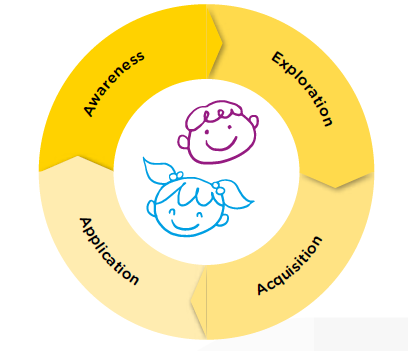Home >
Nurturing Early Learners >
iTeach Principles >
Children as constructors of knowledge
Children as constructors of knowledge
Children as constructors of knowledge
Children are not passive recipients of information but active constructors of knowledge. They constantly build on their prior experiences and interactions to gain new understanding of themselves and the world around them. Children are naturally curious and actively observe their environment to discover why things happen and how things work. They construct knowledge through their daily experiences, exploring, reflecting, interacting, making decisions, and communicating with peers and teachers about what they are experiencing. Through this process, children find out about things on their own, giving meaning to the people, places, and objects around them.
The process of knowledge construction is not a linear one, but rather a dynamic and iterative cycle known as the "Learning Cycle." This cycle involves four distinct stages:

- Awareness: Children become aware of something new, whether through observation, interaction with others, or exposure to new information. This initial awareness sparks curiosity and an interest to learn more.
- Exploration: Driven by their curiosity, children actively explore the new idea or experience with their senses and make new discoveries by asking questions and seeking information. This exploration may involve hands-on activities, discussions with peers, or research through books or the internet.
- Acquisition: Through exploration and interaction, children begin to acquire a deeper understanding of a concept or skill. They may start to form connections between new and existing information, develop new perspectives, and refine their understanding.
- Application: Children apply their newly acquired knowledge and skills in different contexts, demonstrating their understanding and consolidating their learning. This application may involve using the new skill to solve a problem, create something new, or explain a concept to others.
What are the benefits?
Children are not empty vessels waiting to be filled with knowledge, but rather active participants in their own learning journey. By understanding and supporting children's natural process of knowledge construction, educators can empower them to become active learners, critical thinkers, and lifelong learners who construct their own understanding of the world.
How can you do it?
It is crucial to understand and support children's natural process of knowledge construction. This involves creating a learning environment that encourages exploration, discovery, and active participation. Here are some strategies to foster knowledge construction in the classroom:
Provide opportunities for exploration and discovery
Offer children open-ended materials, engaging activities, and real-world experiences that allow them to explore their interests and investigate new concepts.
Encourage questioning and critical thinking
Create a safe and supportive environment where children feel comfortable asking questions, expressing their ideas, and challenging assumptions.
Facilitate collaboration and communication
Encourage children to work together, share their ideas, and learn from each other. This collaborative learning fosters communication skills, problem-solving abilities, and a sense of community.
Connect learning to real-world experiences
Make connections between classroom learning and children's daily lives, helping them see the relevance and application of what they are learning.
Provide ongoing feedback and support
Offer constructive feedback and guidance to help children refine their understanding, overcome challenges, and progress in their learning journey.
